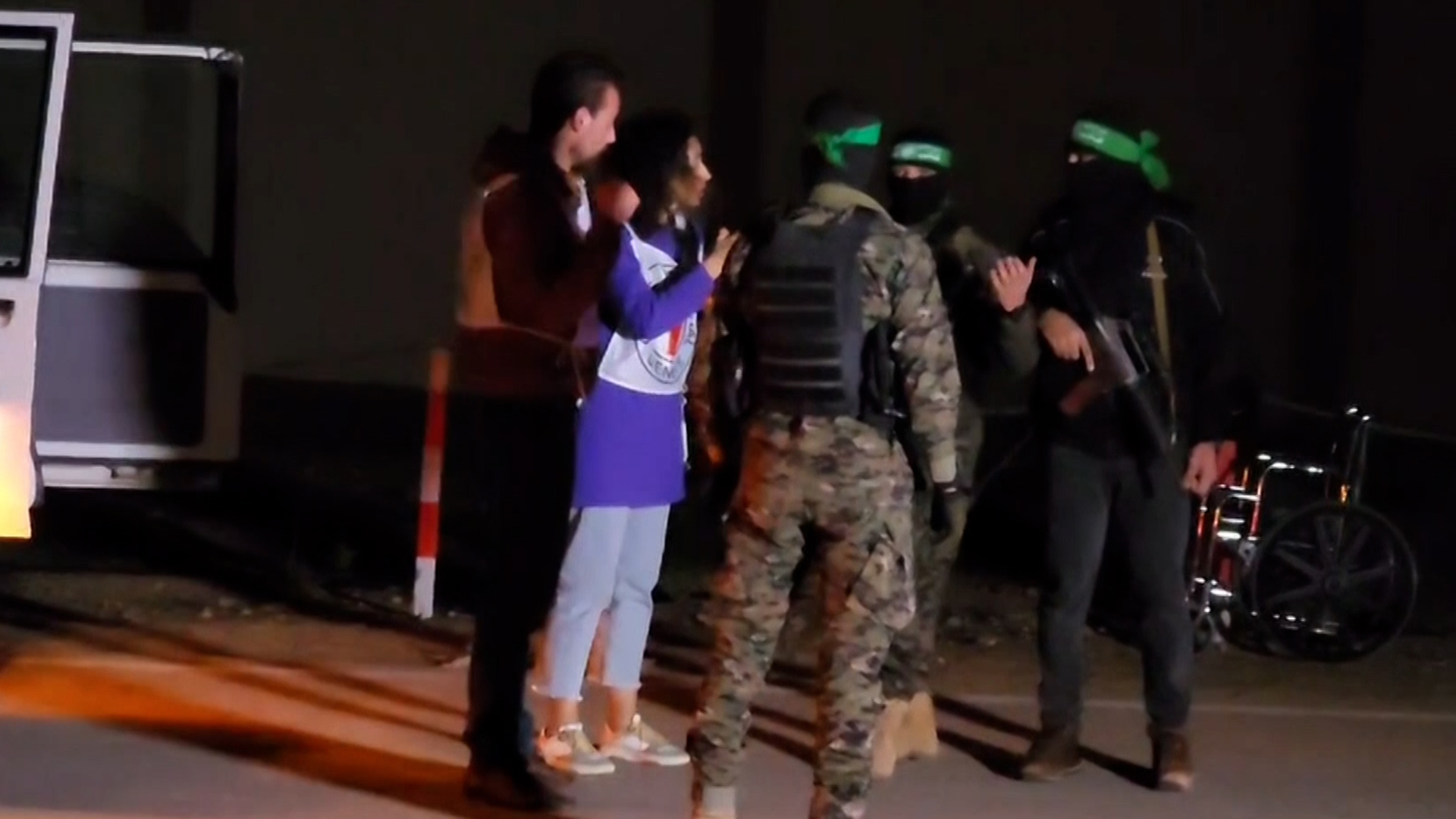Al-Qassam Brigades released 80 Israeli detainees in exchange for the release of 240 Palestinian prisoners from occupation prisons (Al-Jazeera)
Efforts and calls intensified today, Thursday, to reach a ceasefire in the Gaza Strip, amid cautious optimism towards concluding a prisoner and detainee exchange deal between the Islamic Resistance Movement (Hamas) and Israel.
Qatari Foreign Ministry spokesman Majid Al-Ansari said that the Paris meeting (which included the United States, Israel, Egypt and Qatar) came up with one proposal regarding a ceasefire, which was approved by the Israeli side, while the Hamas movement received the proposal in a positive atmosphere, awaiting its response.
In an interview organized by the Foreign Policy Institute at Johns Hopkins University, Al-Ansari expressed his "hope that the coming days will witness good news regarding the truce, even if the situation is volatile." He added that efforts will now focus on the form of a humanitarian truce, although there are many details that must be discussed.
The spokesman pointed out that "optimism is present in light of the agreement between the two parties on the hypothesis that will lead to the next truce, but the mediators still have a difficult road ahead of them."
Qatari mediation, with Egyptian-American support, succeeded in reaching a temporary humanitarian truce on November 24, which lasted for a week, during which 240 Palestinian prisoners were released from occupation prisons in exchange for the release of more than 100 detainees held by the resistance in Gaza, including about 80 Israelis.
The official spokesman for the Qatari Ministry of Foreign Affairs, Majed Al-Ansari (Al-Jazeera - Archive)
Israeli meetings
Al Jazeera's correspondent reported that the Israeli War Council began its meeting this Thursday evening at the Ministry of Defense headquarters in Tel Aviv. She explained that the mini-ministerial council for security and political affairs would then convene to discuss the prisoner exchange deal.
Israeli Channel 12 explained that the meeting will discuss the number of prisoners who will be released if the deal is approved. The channel quoted an Israeli political source as confirming that the disagreement in the negotiations would be over the names of the prisoners, not their number.
In conjunction with the War Council meeting, the families of the Israeli detainees organized a demonstration in front of the headquarters of the Israeli Ministry of Defense in Tel Aviv to pressure the conclusion of an exchange deal.
For its part, Israeli media quoted Israeli Finance Minister Bezalel Smotrich as saying that he did not want to mislead the families of the “hostages” and that there would be no agreement, according to his belief.
The far-right minister added that bringing aid into Gaza contradicts the goals of the war, adding that he spoke to Israeli Prime Minister Benjamin Netanyahu about that, and "the situation will change soon," he said.
He stressed that permanent peace will not be achieved “except when Arab hopes for establishing an Arab state on the ruins of the Jewish state fade,” as he put it.
Families of Israeli detainees intensified their movements demanding that the government conclude an exchange deal with Hamas (Getty-Archive)
Assumed suggestions
Agence France-Presse quoted Hamas officials as saying that the movement is studying a proposal consisting of three stages, the first of which stipulates a six-week truce during which Israel must release between 200 and 300 Palestinian prisoners in exchange for 35 to 40 Israeli detainees, in addition to admitting 200. Up to 300 humanitarian aid trucks to Gaza daily.
For its part, Reuters quoted a Palestinian official, whom it described as close to the talks, without naming him, that it is unlikely that Hamas will reject a proposal put forward by mediators this week for a ceasefire, but it will not sign it without guarantees that Israel will commit to ending the war.
The Palestinian official stated that the text of the proposed agreement includes a first phase lasting for 40 days during which the fighting stops while Hamas releases the remaining civilians from among more than 130 of its detainees. Other stages will witness the release of Israeli soldiers and the handover of the bodies of dead detainees.
Hamas has repeatedly officially confirmed its demand for a complete ceasefire in Gaza as a precondition for any agreement, especially with regard to the release of Israeli detainees.
For its part, the Israeli government talks about a possible truce, but it continues to stress that it will not end its war on Gaza until it eliminates Hamas, releases detainees, and obtains guarantees regarding Israel's security in the future.
Under pressure from the families of detainees to free their relatives in Gaza and from members of his government who, in their opinion, refuse to make major concessions to the Palestinians, Israeli Prime Minister Benjamin Netanyahu stated two days ago, “We are working to reach another understanding to free our hostages, but not at any price.”
Biden confirmed that he is working to bring peace to Gaza and Israel through the two-state solution (Reuters - Archive)
American movements
In the context of efforts to reach a new truce, US Secretary of State Anthony Blinken will return “in the coming days” to the Middle East, according to what an American official announced, without specifying the countries he will visit.
The Israeli Broadcasting Corporation also reported that US President Joe Biden's special envoy, Amos Hochstein, will arrive in Israel early next week.
For his part, US President Joe Biden said today that he is working hard to find a way to return the “hostages,” end the humanitarian crisis, and bring peace to Gaza and Israel through a two-state solution.
Biden said that he is working to establish peace between the Israelis and the Palestinians with the aim of building two states and two peoples living side by side.
Source: Al Jazeera + agencies

